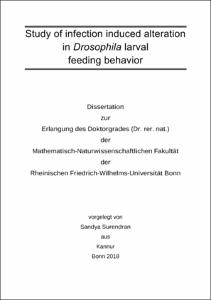Study of infection induced alteration in Drosophila larval feeding behavior

Study of infection induced alteration in Drosophila larval feeding behavior

| dc.contributor.advisor | Pankratz, Michael | |
| dc.contributor.author | Surendran, Sandya | |
| dc.date.accessioned | 2020-04-25T01:14:58Z | |
| dc.date.available | 2020-04-25T01:14:58Z | |
| dc.date.issued | 27.03.2018 | |
| dc.identifier.uri | https://hdl.handle.net/20.500.11811/7535 | |
| dc.description.abstract | Decision making ability is a key trait that can increase an organism’s chances of survival. The animal has to constantly analyze its environment and modulate ones behavior to navigate through daily routine. This study aims at understanding the alteration of feeding behavior in Drosophila larvae when they are given a pathogenic food source. Pseudomonas entomophila (Pe), a Gram negative bacterium is orally given to the larvae, which in turn activates the larval immune system. Simultaneously, larvae alter its feeding preference and show evasion response. Changes in the gut (bacterial infection) lead to a change in feeding behavior. This modulation in the behavior helps larvae escape an otherwise lethal infection. Evasion response was diminished when hugin neurons were inactivated. Release of hugin neuropeptide is therefore necessary for evasion behavior, in addition to its role in bitter aversion. It was also found out that the internal nutritional state of the larvae has an effect on evasion response. Starved larvae showed a weaker response which is in line with the high hugin neuropeptide content in their soma. Thus peripheral information is integrated in the CNS for the animal to be able to generate a behavior or modulate one. Since generating a behavioral response involves CNS, this behavioral assay could be used a powerful assay to screen molecular messengers that can convey peripheral information to the brain. | en |
| dc.language.iso | eng | |
| dc.rights | In Copyright | |
| dc.rights.uri | http://rightsstatements.org/vocab/InC/1.0/ | |
| dc.subject.ddc | 570 Biowissenschaften, Biologie | |
| dc.title | Study of infection induced alteration in Drosophila larval feeding behavior | |
| dc.type | Dissertation oder Habilitation | |
| dc.publisher.name | Universitäts- und Landesbibliothek Bonn | |
| dc.publisher.location | Bonn | |
| dc.rights.accessRights | openAccess | |
| dc.identifier.urn | https://nbn-resolving.org/urn:nbn:de:hbz:5n-50263 | |
| ulbbn.pubtype | Erstveröffentlichung | |
| ulbbnediss.affiliation.name | Rheinische Friedrich-Wilhelms-Universität Bonn | |
| ulbbnediss.affiliation.location | Bonn | |
| ulbbnediss.thesis.level | Dissertation | |
| ulbbnediss.dissID | 5026 | |
| ulbbnediss.date.accepted | 26.03.2018 | |
| ulbbnediss.institute | Mathematisch-Naturwissenschaftliche Fakultät : Fachgruppe Molekulare Biomedizin / Life & Medical Sciences-Institut (LIMES) | |
| ulbbnediss.fakultaet | Mathematisch-Naturwissenschaftliche Fakultät | |
| dc.contributor.coReferee | Bauer, Reinhard |
Files in this item
This item appears in the following Collection(s)
-
E-Dissertationen (4381)




